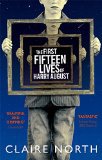Five words from the blurb: death, knowledge, life, before, mystery
Harry August was born in 1919, but when he dies he is born again at exactly the same moment – with a complete knowledge of everything that happened during his previous lives. He discovers a small number of other people who experience the same phenomenon. This secret group support each other, sending messages forwards and backwards in time, until one day they receive a worrying message from the future. Harry must use several lifetimes of knowledge to try to prevent an unbelievable tragedy from occurring.
The First Fifteen Lives of Harry August was chosen by my book group, but I can’t decide whether or not I enjoyed it. There were many things to admire in this book:
- accurate science with theoretical concepts developed to a high level.
- a great cast of characters, some deliciously evil.
- original ideas that stretched the imagination.
- information about global historical events I was unfamiliar with.
- a clever concept that managed to stand up to most scrutiny.
Unfortunately the brilliance of this book was undermined by the fact I was bored for most of time I was reading (listening to) it. The gripping scenes were buried in a mountain of mundane behaviour. I appreciate that this was realistic and the meandering nature of living many lives served an important purpose, but I found it very frustrating. At the end of the book everything came together and I admired what the author was trying to achieve, but I’m not sure the effort of reaching that far was worth it.
The writing style was also quite strange. It had a clipped, almost mechanical feel to it – something probably exacerbated by the narrator. I found it irritating for the first few discs, but after that I managed to cope with it:
“Complexity and simplicity,” he replied. “Time was simple, is simple. We can divide it into simple parts, measure it, arrange dinner by it, drink whisky to its passage. We can mathematically deploy it, use it to express ideas about the observable universe, and yet if asked to explain it in simple language to a child–in simple language which is not deceit, of course–we are powerless. The most it ever seems we know how to do with time is to waste it.” *
There was also a lot of violence in this book. Harry was tortured on many occasions and the graphic descriptions were occasionally too much for me.
Overall I can only admire the ambition of this book – not many authors attempt to include quantum physics in their fiction. Unfortunately no one really understands quantum physics and so it could be implied that no one really understands this book either. The majority of my book group abandoned it and half of me wishes I’d done the same. The other half is proud to have reached the end and (thanks to a quantum physics module in my chemistry degree) have had a slightly better understanding of what was happening than most.
Recommended to patient people of a scientific disposition.

.
Did you enjoy this book or were you as frustrated as I was?
* Quote taken from Goodreads as I could not take one from the audio version.
The First Fifteen Lives of Harry August has been nominated for an Audie in Science Fiction. I’m surprised as I didn’t think it worked that well on audio.
The Armchair Audies are a group of bloggers shadowing this award. Take a look at the Armchair Audie blog for links to reviews of other shortlisted titles.


7 replies on “The First Fifteen Lives of Harry August by Claire North (Audio Book)”
I am of a scientific disposition but don’t know all that much about quantum physics (in fact, I need reminding, a lot!). A pity the physics stopped you from enjoying it to the fullest. I have a copy of the book but it’s not high on my to-read list just yet.
Judith, Unfortunately the physics wasn’t the main problem with the book – it was the rest of it that was dull! I think you’d be OK with this one, but I don’t think you’d fall in love with it either.
hmm. Sounds like an interesting premise, but the quote you gave in particular makes me think it’s not for me
Lucybird, The quote is very typical of the style throughout. It annoyed me a lot at first, but I got used to it in the end. Maybe you’ll get used to it too?
I only recently heard about this one. I would love to give it a try but quantum physics isn’t something I am overly thrilled about reading. Still, I tend to like ambitious novels and maybe I can give this a try and see where it goes.
Athira, If you like ambitious novels then this is for you. Most people were blinded by the science and didn’t even try to understand it. I recommend just going with it – just enjoy the story and don’t even question the science!
Haha, oh no – I just commented on your Bailey’s Prize post saying how much I loved this one and have now scrolled back through my feed to find your review. Interestingly this was given to me by my boyfriend’s Mum, who doesn’t usually read any science fiction, but thought this was great. I tried not to get too bogged down in the intricacies of the physics behind what was going on, which probably helped.